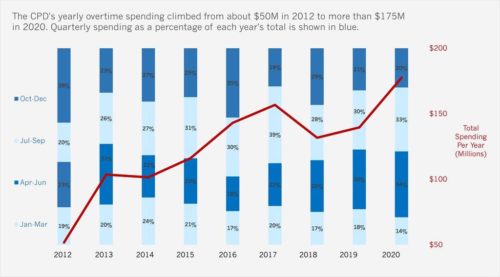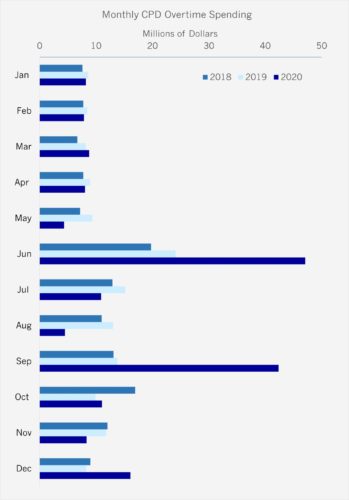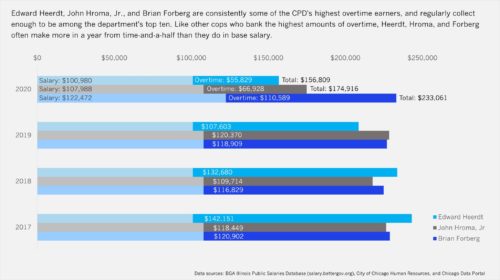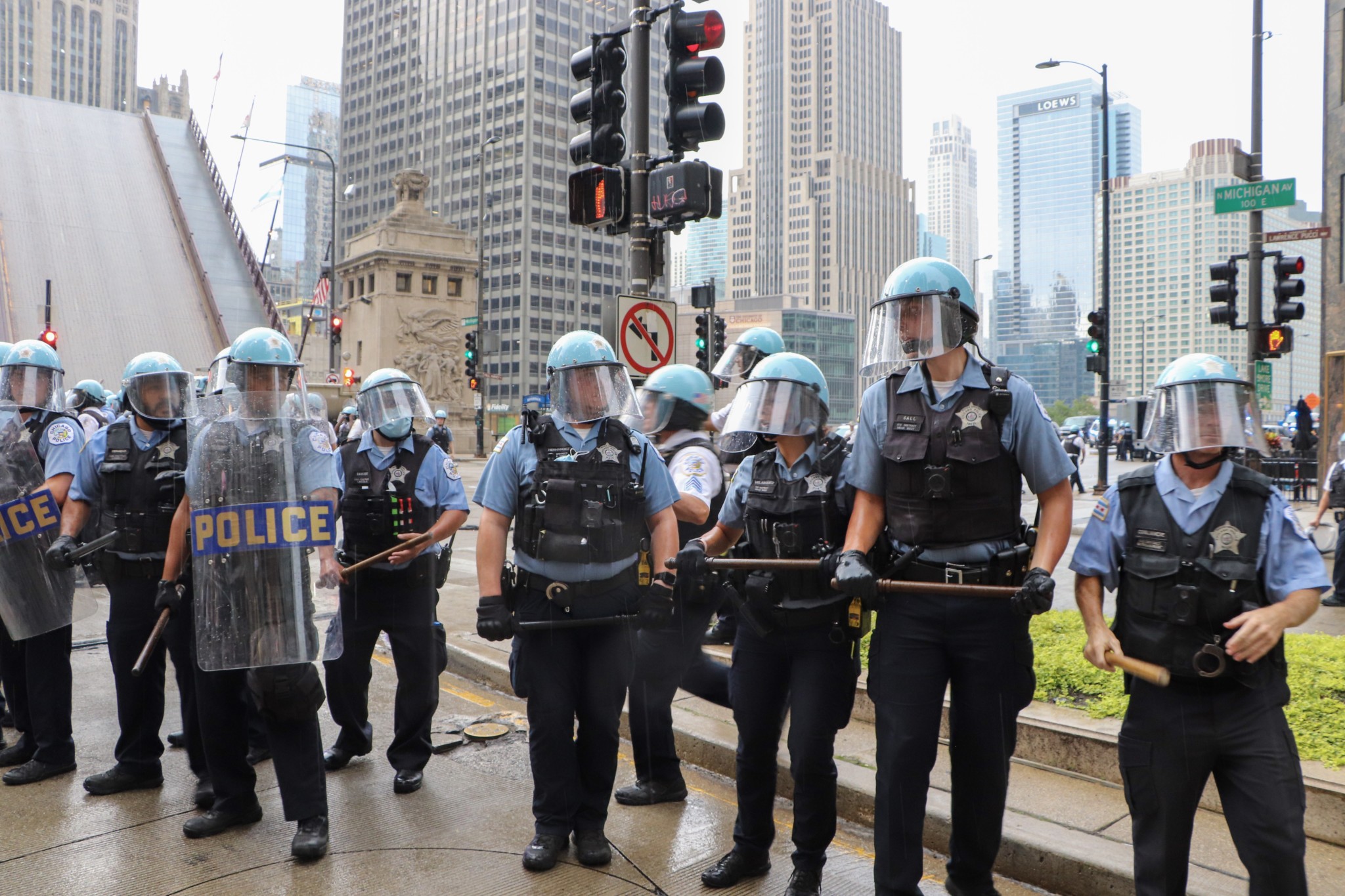The Chicago Police Department spent more than $177 million on overtime last year, a twenty-seven percent jump from 2019 and the highest annual total in recent memory. Staffing shortages caused by the COVID-19 pandemic and responses to popular uprisings against police violence drove much of the spending, and apparently thwarted an early attempt by Superintendent David Brown to keep overtime under control.
Unchecked overtime is not a new problem in the department, and previous efforts to control it have had varying success. Overtime costs have trended upward since at least 2012, when the city began publishing such data online. For much of the last decade, the city has justified steadily increasing the size of the department by arguing that having more officers on the force reduces the need for any given police officer to work overtime, thus saving money. However, as the department has grown to where Chicago has more officers per capita than New York City or Los Angeles, overtime payments have not gone down—in fact, the opposite is true. As the size of the police force has increased, so have overtime expenses.
Despite having spent more than $100 million on overtime every year since 2013, the city budgeted $95 million for CPD overtime and holiday pay in 2020, about $4 million less than the previous year. Brown, publicly pressured by Mayor Lori Lightfoot, attempted to clamp down on overtime soon after he was appointed in April 2020. His efforts were briefly effective. But in June, amid citywide protests against police brutality sparked by the murder of George Floyd by Minneapolis police, CPD’s overtime spending skyrocketed. The department was apparently unable to consistently control it again. Last year’s costliest months were June ($47 million) and September ($42 million).

Days after being sworn in, Brown ordered all overtime requests be approved by a supervisor with the rank of deputy chief or higher, and apparently discussed overtime with department brass. At the time, Lightfoot said Brown’s decision to put deputy chiefs in charge of overtime approval was consistent with the increased level of power and responsibility then-interim Superintendent Charlie Beck gave the chiefs following the department’s organizational restructuring in January 2020. But Alderman Chris Taliaferro, who chairs the Committee on Public Safety, told the Sun-Times he thought it would be “very difficult” for deputy chiefs to authorize overtime ahead of the fact, and that it was a task better suited to district-level commanders.
Brown’s efforts initially had the desired impact: at CompStat meetings (where CPD leadership review crime stats and hold district commanders accountable for their performance) in May, deputy chiefs questioned commanders about overtime in their districts. That same month, spending dropped to $4.3 million, a fifty-percent reduction from the previous six months’ average and the lowest overtime bill of any month since September 2012. But by the end of the month, as shootings and murders peaked around Memorial Day weekend, Brown was taking fire from Lightfoot and Taliaferro, who accused the superintendent of prioritizing overtime reductions over violence prevention.
By June, any focus on controlling overtime was lost as near-daily protests against racism and police violence spread across the city. The CPD canceled days off and put most officers on mandatory twelve-hour shifts as the entire department mobilized to confront protesters and suppress uprisings. June’s overtime spending ballooned to the highest single-month total since at least 2012.
More than ninety-seven percent of the overtime CPD clocked between May 30 and June 8—some 785,000 total hours—was for policing a “planned gathering, march, or civil unrest.” That alone accounted for about half of all the overtime hours between January and July, according to data the Weekly obtained. An analysis by The Triibe counted eleven demonstrations in Chicago during that ten-day stretch.

September’s bump was likely driven in large part by Brown’s decision to again cancel days off and put officers on twelve-hour shifts ahead of Labor Day Weekend in an attempt to prevent anticipated violence. Despite the days of extra duty, the city still had more murders that month than any September since 1993.
The rest of September’s nearly unprecedented overtime may have been due to the heavy police presence at protests that month, such as the ones held after a Kenosha, WI, cop shot Jacob Blake in the back, and again after a Kentucky grand jury failed to indict the Louisville police officers who shot and killed Breonna Taylor.
As in previous years, a small number of officers accrued a disproportionate share of the department’s overtime payouts. The highest-earning six percent—about 800 of the department’s 13,000 sworn—were responsible for nearly twenty percent of the CPD’s overtime spending in 2020.
The same officers regularly appear at the very top of the department’s overtime-earnings lists, and some of the highest-earning cops take home as much or more in overtime as they do from their base salaries. The cop who earned the most overtime took home $110,000 on top of his six-figure salary; the average officer’s overtime pay was $13,725.

One such officer, Sergeant Brian Forberg, has been among the department’s highest overtime earners for nine years running. In 2020 he made $110,589 on top of his $122,472 salary. Since 2012, Forberg—who has racked up at least thirty-eight complaints over his career—has collected almost a million dollars in overtime. In 2013, the city paid a $3.4 million settlement to a man who was exonerated of a murder he had been falsely convicted of because Forberg and other officers coerced testimony from witnesses and buried exculpatory evidence. The year the settlement was adjudicated, the sergeant took home more than $80,000 in overtime. Forberg has earned more than six figures on top of his salary every year since 2014.
On Feb. 12, CPD provided a statement to the Weekly that said the department “is continuously working to find the most efficient and effective ways to deploy our resources and coordinate our response. CPD continues to work closely with the Mayor’s Office, Office of Public Safety Administration, and the Budget Office to review overtime budgets and implement targeted spending limits to further establish a greater level of accountability as we seek to not simply reform CPD but transform it.”
Correction, February 21, 2021: An earlier version of this piece misstated the number of overtime hours during the civil unrest between late May and early June.
This reporting was supported by a grant from the Fund for Investigative Journalism
Jim Daley is the Weekly’s politics editor. He last interviewed South Shore rapper PhalaiR. Kiran Misra primarily covers criminal justice and policing for the Weekly. She last reported on COVID vaccinations for people incarcerated at Cook County Jail.

